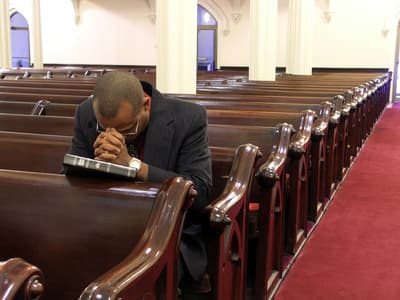Be Peaceful and Not Pugnacious

This post was first published in January, 2015. —ed.
The church’s highest office demands the highest moral character. And one of the most accurate indications of a man’s true character is how he responds when he is challenged or criticized. That is why Paul excludes pugnacious people from the office of elder or pastor.
An overseer, then, must be above reproach, the husband of one wife, temperate, prudent, respectable, hospitable, able to teach, not addicted to wine or pugnacious, but gentle, peaceable, free from the love of money. (1 Timothy 3:2–3, emphasis mine)
Pugnacious literally means “a giver of blows,” or “a striker.” A leader in the church must not be one who reacts to difficulty with physical violence. He must not settle disputes with fighting.
Likewise, an elder must not have a propensity to anger. Pugnacious people normally have a “short fuse” and are easily provoked. But those who lead God’s people must react to situations calmly and with gentleness (cf. 2 Timothy 2:24–25).
Instead of being pugnacious, a leader must be gentle. Gentle describes the person who is considerate, genial, forbearing, and gracious, who easily pardons failures and mistakes. Such a person remembers good, not evil. A godly leader, when wronged, must have no thought of retaliation.
Far from looking for revenge, the godly shepherd is peaceful and reluctant to fight—in Paul’s words, he is peaceable. More specifically, he is not an argumentative person. To have a contentious man in leadership will result in disunity and disharmony, seriously hindering the effectiveness of that leadership team. “The Lord’s bond-servant,” on the other hand, “must not be quarrelsome, but be kind to all, able to teach, patient when wronged” (2 Timothy 2:24).
As James points out, “The anger of man does not achieve the righteousness of God” (James 1:20). The qualified pastor must carefully guard against a spirit of hostility, resentment, and anger—even when everything in the church seems to be going the wrong way and the people are critical or indifferent.
Too many pastors have ruined their ministry by building up a file of wrongs done to them. I have known men who abandoned their churches and left the ministry because they cannot get over the fact that somebody criticized them, said something against them, or did something that upset them. They carry around a list of grievances that eventually makes it impossible for them to serve and lead.
Others today adopt an immature machismo. They love and celebrate brashness and violence as a measure of their manliness. They talk and act tough to combat the influence of a feminist culture. But their volatility and swagger have nothing in common with biblical manhood, and prevents them from faithfully shepherding God’s people.
Instead, the godly shepherd is gentle and peaceable, leading the church with kindness and patience. Rather than looking for a fight, he’s looking to serve. Setting aside his own ego, pride, and self-interest, he joyfully submits to God and graciously sacrifices for his congregation.





